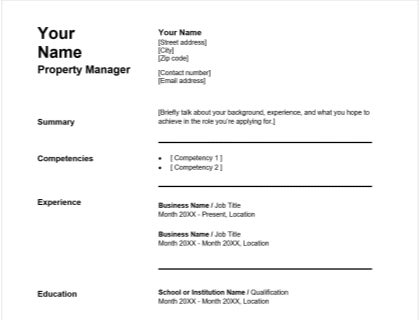
Property Manager Resume — Free Template Download
Download this property manager resume template in Microsoft Word format.
Download NowProperty Manager Resume Example:
Your Name
Property Manager
[Street address]
[City]
[Zip code]
[Contact number]
[Email address]
[LinkedIn profile / website]
Summary:
[Briefly describe your background, expertise, and qualifications.]
Competencies:
[Skill 1]
[Skill 2]
Experience:
Company Name / Job Title Month 20XX - Present, Location
Company Name / Job Title Month 20XX - Month 20XX, Location
Company Name / Job Title Month 20XX - Month 20XX, Location
Education:
School Name / Qualification Month 20XX - Month 20XX, Location
School Name / Qualification Month 20XX - Month 20XX, Location
Certificates and Licences:
[Certificate 1]
[License 1]
Achievements:
[Notable career achievement description 1]
[Notable career achievement description 2]
Awards and Promotions:
[Service award 1]
[Job promotion 1]
How to Write a Property Manager Resume:
A complete guide to writing a property manager resume with a free template.
Start with a summary.
Make your summary stand out.

You'll want your summary to create a great first impression. Start by showcasing your most desirable qualities including your skills, years of experience, and top achievements. Briefly elaborate on why you're applying and how the job aligns with your career path.
Keep your summary short and to the point.

Aim to keep your summary under four sentences and only include the most pertinent information. End with a sentence about how your specific skill set and experience will make you a suitable property manager and how you envisage adding value.
List your competencies.
Start with your most impressive skills.

It is crucial to highlight your key skills as a property manager near the top of the page to draw the employer's attention. Make a bulleted list that includes core skills such as preparing financial reports, screening tenants, enforcing occupancy policies, collecting rent, and more.
Don't neglect to mention all relevant skills that could set you apart from other candidates, for example, a background in property portfolio or asset management, knowledge of property law, etc.
Align your skill set with the job posting.

List all relevant skills and competencies you have acquired over time. You'll want to directly match your competencies with the job requirements.
If the job ad, for example, requires marketing properties or negotiating lease agreements, explicitly mention your experience in that regard. Do not list skills that will not be needed for the position.
Be truthful.

When listing your skills, remain honest and realistic about your abilities as the later stages of the hiring process typically require answering in-depth questions. It may also include assessments based on hypothetical scenarios.
Highlight your professional experience.
List your work history in reverse chronological order.

The work experience section is an imperative part of your resume as employers will want to learn about the responsibilities you've been assigned as a property manager in previous roles.
Start this section with your most recent position. You'll want to list the jobs you've held by job title, employer, start and end dates, and location.
Indicate your core responsibilities.

Under each entry, briefly describe what you did in each role in bullet format. Pay special attention to your key duties. This will help employers envision you in the role and determine the type of tasks you're knowledgeable in.
Outline your qualifications.
Add your education information.

In reverse chronological order, add your qualifications. Each qualification entry should mention an institution name, the dates of attendance, and a location. Employers typically look for a Bachelor's degree in real estate and property management, or related degrees in business administration, finances, etc.
Mention qualifications in progress.

If you're currently studying toward a qualification, write "In progress," followed by the date you expect to complete the qualification.
Add your professional licenses and certificates.
List any relevant licenses and certificates.

List any professional licenses and certificates that you've obtained during your career. Be guided by the requirements in the job ad. Consider what employers would be most interested in and mention it first.
Common licensures and certifications related to property management roles include:
- Certified Property Manager (CPM).
- Real Estate Broker License.
- Property Management License.
- Certified Manager of Community Associations (CMCA).
- Residential Management Professional (RMP).
- Certified Apartment Manager (CAM).
Add details to your credentials.

State-prescribed or industry-specific licensures and certifications indicate compliance with industry requirements and demonstrate your commitment to professional development. Be sure to mention the institutions and the dates you obtained your credentials.
Showcase your career achievements.
Add notable career successes.

Your career achievements are a great addition to your resume because they act as solid references, proving to employers that you're more than capable of exceeding their expectations.
You'll immediately want to capture an employer's attention, so start this section with your most impressive accomplishment as a property manager.
Describe your accomplishments.

You'd need to provide sufficient details of your accomplishments, for example, increasing Net Operating Income (NOI) by successfully increasing revenue income and limiting expenses, meeting lease obligations by responding to tenant concerns in a timely manner, and more.
If possible, add metrics to emphasize the impact your work had on the business. This might include that you exceeded occupancy targets by 20%, etc.
List any awards and job promotions.
Add key career milestones.

To provide employers with additional insight, be sure to list instances of professional recognition that may be of particular interest to them. These typically include awards of achievement or merit, or job promotions.
Include descriptive details.

Use bullet points to briefly describe each career award and noteworthy job promotion and list them in reverse chronological order. Remember that each entry should also identify the employer and don't neglect to provide a date.


